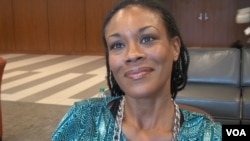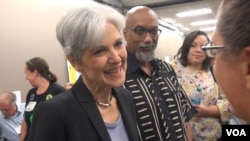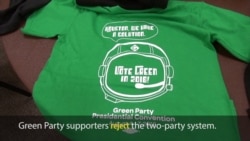Robin Laverne Wilson, a Green Party candidate for the U.S. Senate from New York, says she's out to unseat a "dinosaur" as she challenges incumbent Charles Schumer, a Democrat who has held the job since 1999.
Asked Friday whether she had a chance of winning against such a formidable opponent, Wilson responded, “Do I have a chance? I have a chance to challenge him, a chance to make him accountable, a chance to rally the millions of people who are disgruntled with the status quo.”
Wilson, 42, in Houston for her party's presidential nominating convention, described Schumer as an “old man” entrenched in power. She said both Democrats and Republicans had failed the country.
Many Greens, as party members call themselves informally, see this presidential election as an opportunity to pull voters away from the two major parties that dominate the election process.
Polls indicate that Democratic nominee Hillary Clinton and Republican nominee Donald Trump are the most unpopular presidential candidates in modern U.S. history.
Recent polls also show some increase in support for both the Libertarian Party and the Green Party, but not nearly enough for either of those parties to claim the U.S. presidency.
Impact on outcome
What they could do, however, is attract enough voters from either the Democrats or Republicans to influence which of those two parties’ candidates will win the presidency.
Democrats, in particular, are worried about the Green Party because its principal issues and proposals are similar and many young people who supported Vermont Senator Bernie Sanders in the Democratic primaries and caucuses might go to the Green Party rather than vote for Clinton.
The Libertarian Party, which has chosen former New Mexico Governor Gary Johnson as its presidential candidate, is likely to attract fiscally conservative Republicans who are deeply troubled by Trump and his bombastic style. But the Libertarians also appeal to some Democrats who are unhappy with Clinton.
Green Party national spokesman Scott McLarty told VOA that his party does not accept donations from corporations, as opposed to both Democrats and Republicans, who he said are deeply beholden to corporations, banks and wealthy donors.
“There are two parties of war and Wall Street — that is not serving America, that limitation is not good for a country this big," McLarty said.
The U.S. Green Party is affiliated with Green parties in other nations and is sometimes thought of as principally concerned with environmental issues.
Climate issue, and more
McLarty said there is a strong party commitment to doing something to address climate change, which he says is a serious problem the major parties have failed to adequately address. But he said there is more to the party than that.
“We are a party for working people, we are a party for poor people; we are a party that stands up for economic justice and human rights,” he said.
McLarty said the Green Party had drawn about 500 people to its convention, with participants coming from almost every state in the nation. The four-day gathering runs through Sunday on the campus of the University of Houston.
Discussions have been mostly civil and subdued, but there has been some discord over the nominating process, in which several candidates are challenging presumptive nominee Jill Stein, a physician from Massachusetts who also ran as the party's presidential candidate in 2012.
There was a brief moment of shouting on Friday as two professed candidates complained that they were being left off the list of speakers, but party officials quickly quelled the dispute.
Officials said Stein began her path toward the nomination over a year ago, traveling around the nation and gaining sufficient support from delegates to earn the designation as presumptive nominee.
WATCH: Green Party Convenes in Houston
'Clamoring' for change
Appearing at a gathering of convention participants late Friday, Stein said American voters "have had it with the two establishment candidates, who are the most disliked and untrusted in history. Most people are clamoring for what we've got, which is a politics of integrity, a politics of justice, a politics that is of, by and for the people."
But reaching voters may be difficult, because the Green Party lacks the funds of the two major parties, and a federal judge on Friday rejected a lawsuit by both the Green and Libertarian parties to be allowed in this fall's presidential debates.
An agreement between the Republican and Democratic parties and the Commission on Presidential Debates requires presidential candidates to reach at least 15 percent in an average of five national polls in order to earn a place on the debate stage.









